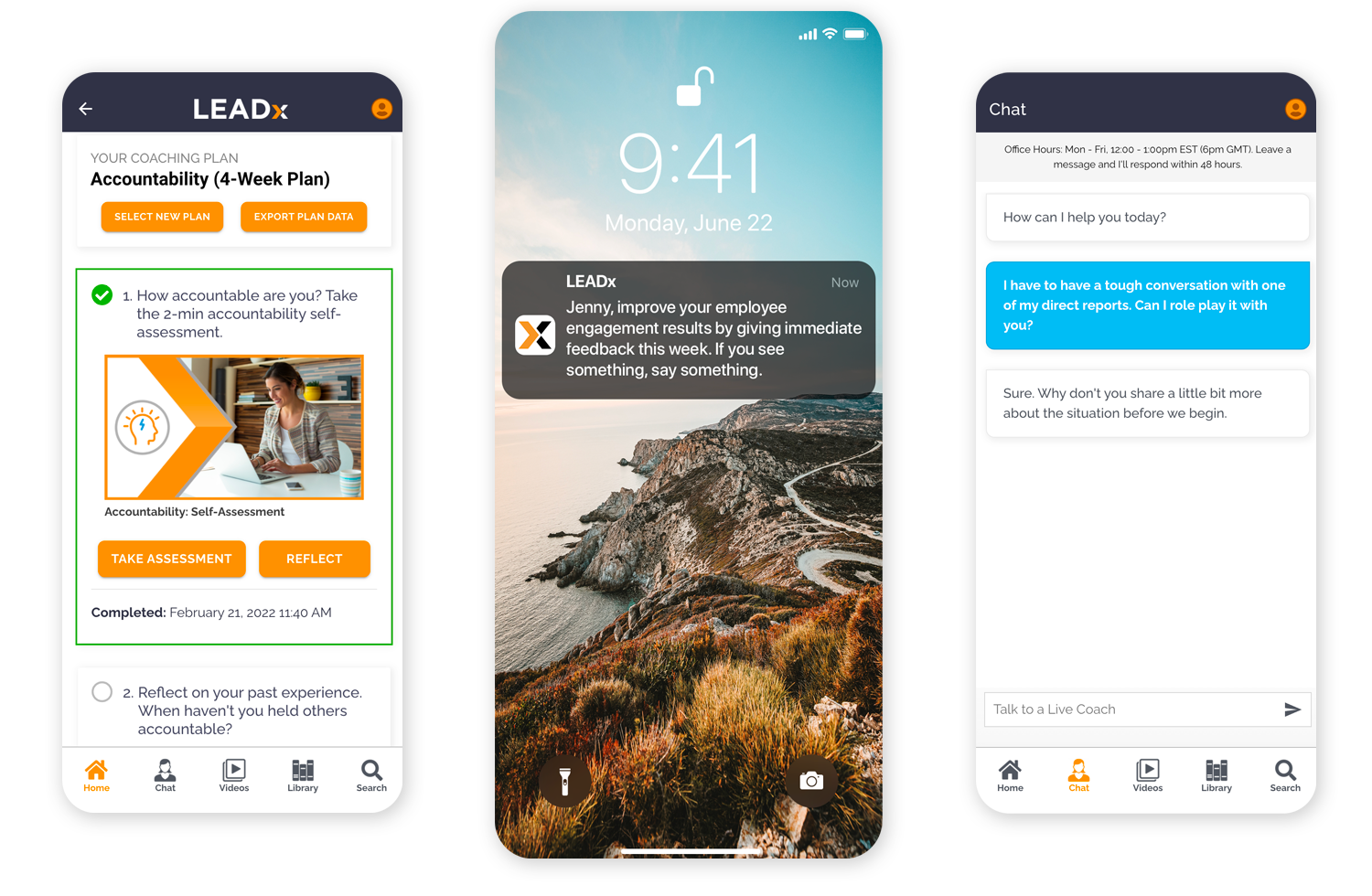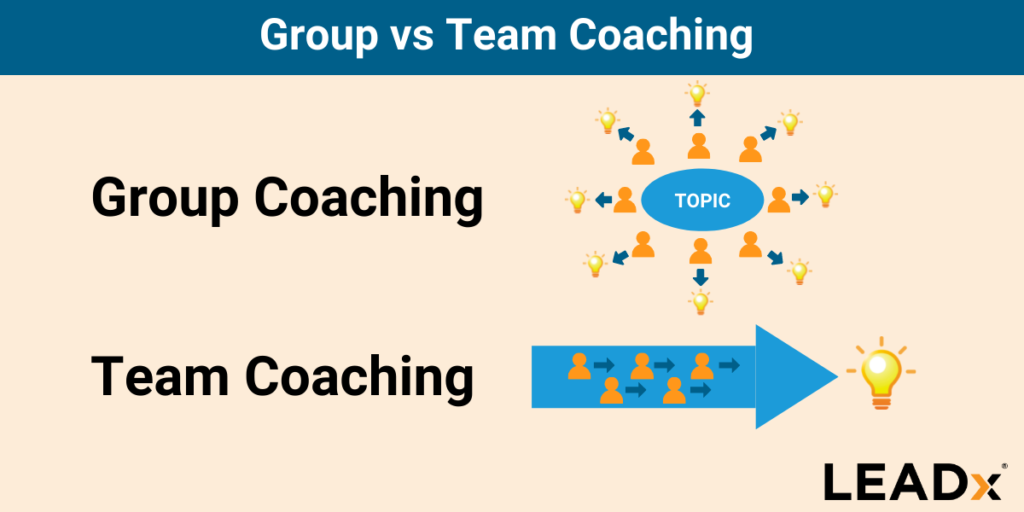
Group Coaching: Definition, Programs, Prices
Leadership coaching is a popular method of developing leaders and Group Coaching programs have become the fastest growing coaching model. This is because Group Coaching can achieve equal or greater results than classic one-on-one coaching but at a fraction of the cost and administrative effort.
Why is it so effective? According to Harvard Business Review, reasons include:
- Immersion into real-time group dynamics
- Insights from diverse perspectives
- Opportunities to practice new skills in a safe space
- A built-in accountability system
- A support network that will last beyond the coaching program
Traditional training workshops have long suffered from the Knowing-Doing Gap; things learned in the workshop are never applied back on the job. Group Coaching solves this problem by putting the focus on real-world problem solving, brainstorming, and accountability from one’s own peers.
The Definition of Group Coaching
What is Group Coaching? Also known as “Peer Group Coaching,” it’s a method where one coach supports a group of people as they strive to improve certain behaviors or outcomes. The coach facilitates a psychologically safe environment for the participants to talk, share, discover, and support each other.
Unlike “team coaching”, in group coaching, the participants don’t have to actually work together in their day-to-day roles, and the focus is on improving each individual. In team coaching, the participants all work together with a shared purpose and goals, and the focus of the coaching is to improve the team’s overall performance.
Group Coaching Programs
There are literally a limitless number of Group Coaching Programs that could be launched for an organization. The ultimate goal is of course to improve the behaviors and skills of the group members. As with any talent development initiative, just ask yourself, “What skill or behavior do we want our team members to be great at?”
Example #1: An organization launches “Women in Leadership” to develop skills around confidence, networking, gaining visibility for work, and powerful communication. Group coaching sessions are held each month, for several months.
Example #2: An organization launches “First-Line Managers” for managers who recently graduated from the New Manager Academy. Focus areas are giving feedback, delegation, crucial conversations, and accountability. Group coaching sessions are held each month, for several months.
Example #3: An organization launches “Diversity, Inclusivity, Belonging” for all employees. Focus areas are unconscious bias, dimensions of diversity, and managing microaggressions. Group coaching sessions are held twice monthly, for several months.
The Benefits of Group Coaching
The benefit of Group Coaching to an organization is that it is the most effective and affordable means of developing talent and organizational capability. Instead of spending thousands of dollars a month for one coach to develop one employee, leverage that same expense across 5-20 individuals who are participating in the group. Additionally, as relationships strengthen among group members, there will be a natural improvement in working across different areas of the business.
The benefits to the participants are numerous:
- Improvement in the targeted behavior or objective
- Improved active listening and coaching skills as a byproduct of service as a peer-coach
- Increased engagement from forming more at-work friendships
- Increased resilience knowing there are numerous peers who “have your back”
- Increased accountability and commitment knowing peers will be doing a check-in
Additionally, there are even benefits to the coach:
- Able to support more coachees in less time (scale!)
- Better overall value for your customers
- Makes scheduling far less complicated
- Able to scale income potential
Pre-work, Post-Work, Assignments
You can enhance the time spent inside Group Coaching sessions with thoughtful pre-work or post-work. Similar to the “flipped classroom model”, participants can be assigned individual learning and application activities in the weeks prior to the coaching session.
Example #1: Women in Leadership (Impostor Syndrome)
- Week 1: Participants read The Impostor Syndrome book summary
- Week 2: Participants complete the Impostor Syndrome Self-Assessment
- Week 3: Participants notice and record their impostor-like thoughts
- Week 4: Participants activate positive self-talk in response to impostor thoughts
- Week 5: Group Coaching session with a cohort of peers
Example #2: Manager Development (Giving Effective Feedback)
- Week 1: Participants complete the Effective Feedback video course
- Week 2: Participants ask team members to give them candid feedback
- Week 3: Participants give only positive feedback
- Week 4: Participants begin to give constructive feedback
- Week 5: Group Coaching session with a cohort of peers
Group Coaching vs Individual Coaching
Most people are familiar with individual coaching or “executive coaching,” which consists of one coach and one client (i.e., coachee). Typically, each session is between thirty to sixty minutes, taking place once or twice a month. In these engagements, it is typical for the client to choose the goal and the agenda for each session. The coach puts in extra effort to make sure the client “owns” the process.
There are many types of people who engage in individual coaching including:
- Individuals who were recently promoted to a new level of leadership
- Individuals who need to improve in a specific area like productivity
- Individuals who want to develop their career
- Individuals who have been selected for extra support as part of an emerging leader or high-potential program
- Individuals who have been selected for extra support as part of a special population like female leaders, or members of a traditionally disadvantaged group
The downside to individual coaching is that it is expensive. One-on-one executive coaching typically costs $600 to $10,000 per month.
Small-Group Coaching: Designing Cohorts
Group Coaching programs typically follow a cohort model. Participants sign up in advance, begin and end on the same day, and generally work together as a cohort for a given period of time (i.e., the cohort members stay in the same cohort for three to six months or until the end of the program).
The ideal cohort size is six or fewer participants, as this enables a skilled coach to facilitate a powerful conversation among participants. It is common however to have cohorts as large as 20 people, and in these cases, the coach may use breakout sessions in pairs, triads, or larger to achieve the small-group psychological safety that drives the whole process.
The Secret to Great Programs
Just as in 1-on-1 coaching, in Group Coaching the relationship between the coach and coachee, and the relationship between the coachees is critical. The foundation of success is taking the time to build rapport and trust; nothing will happen until participants feel comfortable sharing real-world challenges, experiences, thoughts, and feelings.
A great practice is for the coach to have a one-on-one conversation with each participant before the first session. If this isn’t possible, the first Group Coaching session should confirm the topics or themes of the overall program, and share best practices for being a “peer coach”. You can use special rapport-building exercises or breakout sessions to foster individual connections, too.
Unlike 1-on-1 coaching sessions where the coachee sets the agenda for the session, in Group Coaching Programs the coach anchors the theme for the session and facilitates a discussion that stays focused on that theme.
Additional Resources:
Pricing: What Does It Cost?
Group coaching costs vary greatly depending on the length of each session, the talent of the coach or coaching organization, the number of participants in each group, and the subject matter at hand.
As a rule of thumb, you should expect each 60-minute group coaching session to cost approximately US $1,500.
Background information:







